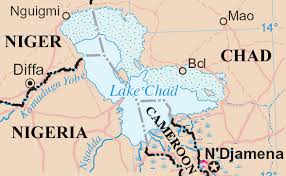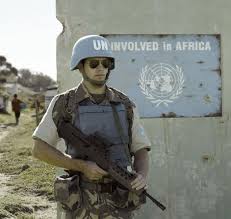It is no surprise that climate change adversely impacts developing countries and, more specifically, those of a politically or economically fragile nature. Countries of arid or semi-arid lands, such as Nigeria, are particularly vulnerable to the effects of climate change. This is due to the fact that temperature irregularity and rainfall fluctuations make the countries more susceptible to drought or flooding, leading farming and pastoral lands to be impacted adversely. As a result of the rise of climate change, Boko Haram, an insurgent group aligned with the Islamic State (IS), is taking advantage of Nigeria’s vulnerability and, in turn, climate-related displacement is on the rise. Although they are the least responsible for causing it and are ill-equipped to deal with it, the world’s most vulnerable people often have to bear the most extreme impacts of climate change.
Nigeria’s population is growing at a considerable rate, which will only increase the demand for the diminishing resources. Back in 1960, when Nigeria declared independence from the United Kingdom, Nigeria’s population was estimated at 45.2 million people. As of 2019, the population has risen to over 200.96 million, ranking seventh in the world. In 2019, the Nigeria’s climate-linked refugee crisis went into its sixth year. The main impact of climate change on Nigeria is the shrinking of the Lake Chad basin. Lake Chad spans several countries, including Nigeria, Chad, Cameroon, and Niger. It is the source of water for millions of people in West Africa. According to the UN Environment Programme, since the 1960s, Lake Chad’s water supply has shrunk by 90% and continues to be at risk for further exploitation. A recent UN Resolution excerpt on the ongoing drought in Lake Chad states that researchers recognize “the adverse effects of climate change and ecological changes among other factors on the stability of that Region, including through water scarcity, drought, desertification, land degradation, and food insecurity…” Climate change has, and will continue to, drive Nigerians into a state of susceptibility, creating a vacuum for unending problems.
Beginning in 2009, insurgent group Boko Haram has taken advantage of vulnerable communities. As a result, Nigerians are left in a state of utter desperation, due primarily to a lack of proper infrastructure and a harsh climate. Robert Muggah, an analyst in climate security, reported that “climate shocks and stresses are pushing many into extreme poverty. Joining an armed group is sometimes the only option.” Since the ascent of Boko Haram, approximately 2.4 million people have been displaced, the majority being displaced internally. They are left with two daunting options: joining Boko Haram or fleeing. The recurring issue is that those fleeing are not being properly protected. There is a lack of government regulation and protection put in place to help those who are been forcibly displaced from their homes. The combination of a harsh climate, poor infrastructure, and a lack of basic services is allowing the Nigerian crisis to spiral out of control. The Nigerian military, along with a Multinational Joint Task Force, have driven extremists from many areas. Yet the refugee crisis remains acute, as all the contributing factors are not being properly dealt with. Despite their reverses, Boko Haram is continuing to recruit vulnerable communities in their war efforts.
The UN Convention relating to the 1951 Status of Refugees recognizes that a solution to ongoing refugee crises cannot be solved without international attention and cooperation. This is due to the fact that people who are displaced because of climate change are likely to need international attention, as climate change is an international problem and responsibility. Therefore, Refugee Law is a necessity in the protection of vital human rights. Worldwide, weather-related threats have displaced approximately 16.1 million people in 2018 alone. The effects of climate change are amplifying the frequency and intensity of sudden natural disasters, such as hurricanes, droughts, and rising sea levels. It was estimated by the UN World Water Assessment Program that by 2050, between 150 to 200 million people will be forced to flee their homes due to climate change related issues, such as desertification and overall extreme weather conditions. The Assessment reflects the ongoing concern, and sad reality, that governments worldwide are not taking the proper precautions to combat climate change. This creates the problems of extremist groups taking advantage of climate-related vulnerabilities to expand their military operations.
In order to protect people displaced due to climate change from being lured into extremist groups, countries must invest in adaptation programs that embody the goal of reducing people’s overall vulnerability outlined by the UN. Adaptation programs on climate change protection involve diversifying countries’ crop production and investing in more renewable energy, in particular solar panels. In terms of diversification, the UN recommends moving away from irrigation and animal agriculture, and towards rain fed crops such as lentils and chickpeas. Without confronting climate change head-on, the issue of displacement and unremitting human rights violations will not be solved and, as a result, a power vacuum will ensure future instability and chaos in some of the world’s most vulnerable regions.
Disclaimer: Any views or opinions expressed in articles are solely those of the authors and do not necessarily represent the views of the NATO Association of Canada.
Featured Image: The Lake Chad basin provides water to over 30 million people in the countries surrounding it (Chad, Cameroon, Niger, and Nigeria) but is now shrinking due to climate change. (2013) via Wikimedia Commons. Public Domain.
-
Emma Tallon is currently entering into her fourth year at the University of Toronto, St. George, with a degree majoring Political Science and minoring in History and English Literature. She is passionate about bringing awareness to humanitarian and environmental issues in order to incite debate and discussion on how to resolve the issues. She is the incoming Vice-President of Amnesty International’s chapter at the University of Toronto for the 2019-2020 academic year.
View all posts




